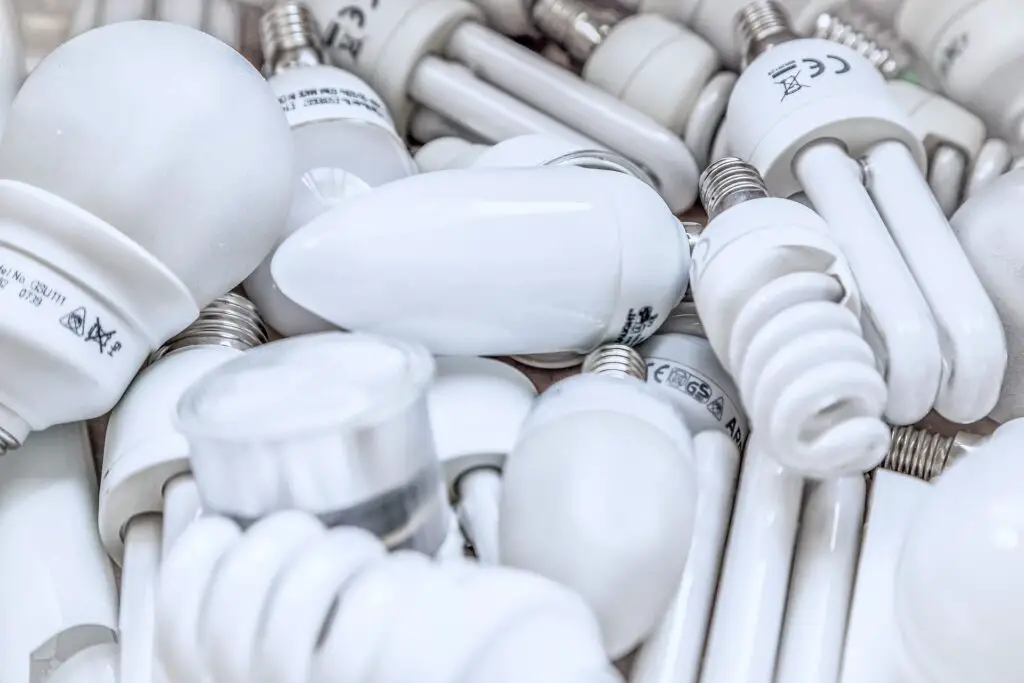Light bulbs are an essential part of any home or business. They provide light and visibility in our indoor and outdoor spaces, and they come in a variety of shapes, sizes, and styles to suit different needs. However, like all household items, light bulbs eventually reach the end of their lifespan and need to be disposed of properly.
So, how can you dispose of light bulbs safely and responsibly? First, you should check with your local waste management company to see what their guidelines are for disposing of light bulbs. Many companies have specific instructions for disposing of light bulbs, and it’s important to follow these instructions to ensure that the bulbs are disposed of properly.
How you throw away light bulbs depends on the type of bulb. If you have incandescent light bulbs they simply be thrown in with regular trash. Fluorescent bulbs and LED bulbs both contain hazardous waste and should be disposed through your local household hazardous waste program.
Many cities and towns offer these programs that allow residents to dispose of light bulbs and other household items that contain hazardous materials. To participate in a hazardous waste program, you will need to contact your local waste management company to find out where and when the program is held. To make the process easier, we keep an small bin for any bulbs that we need to dispose of in hazardous waste.

Recycling light bulbs
Another option for disposing of light bulbs is to recycle them. Many light bulb manufacturers offer recycling programs for their products, and some retail stores that sell light bulbs may also have recycling programs in place.
To recycle your light bulbs, you will need to contact the manufacturer or the store where you purchased the bulbs to find out what their recycling program entails. You may be required to bring the light bulbs to a designated location for recycling, or you may be able to mail them to the manufacturer for recycling.
Can you throw light bulbs away?
You should not throw away light bulbs in the regular trash, unless they are incandescent bulbs. Proper disposal of light bulbs is important for several reasons. First and foremost, fluorescent and LED light bulbs contain materials that can be harmful to the environment if not disposed of properly.
Fluorescent and LED bulbs contain metals, such as lead and mercury, as well as glass and other chemicals. If these materials are not properly disposed of, they can leach into the soil and water, causing harm to plants, animals, and even humans.
Aside from being harmful to the environment, any type of light bulbs can also pose a safety hazard if not disposed of properly. Broken light bulbs can shatter, releasing sharp glass shards that can cause injury if not handled carefully. Have you ever cut yourself on glass shards through the trash bag? Not fun!
Light bulbs that are not properly disposed of can also be a fire hazard if they come into contact with flammable materials.
Reduce the amount of light bulbs you throw away
There are several steps you can take to reduce the amount of light bulbs you throw away, including:
- Switch to energy-efficient light bulbs: LED and compact fluorescent (CFL) bulbs do use less energy than traditional incandescent bulbs, which means they last longer and need to be replaced less often. This not only saves you money on your energy bills but also reduces the number of light bulbs you need to dispose of.
- Properly maintain your light bulbs: Regularly cleaning your light bulbs and replacing them when they burn out can help extend their lifespan, which means you will need to replace them less often.
- Use task lighting: Instead of using a single overhead light, try using multiple smaller light sources, such as table lamps or floor lamps, to illuminate specific areas of a room. This can help you reduce the overall number of light bulbs you use and extend the lifespan of each bulb.
- Consider dimming your lights: Dimming your lights can help extend the lifespan of your light bulbs and reduce the amount of energy you use. This can also help create a cozy atmosphere in your home and reduce the number of light bulbs you need to replace.
- Choose the right light bulb for each room: Different rooms in your home may have different lighting needs, so it’s important to choose the right light bulb for each space. For example, using a soft white bulb in a living room or bedroom can create a warm and inviting atmosphere, while using a bright white bulb in a kitchen or bathroom can provide more visibility and task lighting.
Disposing of light bulbs properly is important for the environment and for safety reasons. Light bulbs contain materials, such as lead and mercury, that can be harmful if not disposed of properly. Broken light bulbs can also pose a safety hazard if not handled carefully.
By following these guidelines and taking steps to reduce the amount of light bulbs you use, you can help protect the environment and prevent safety hazards.
